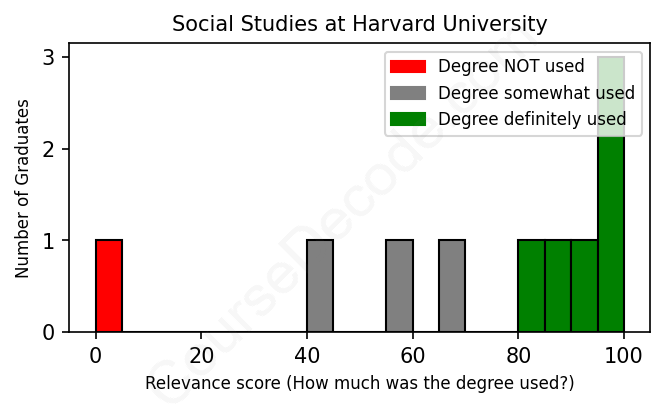
First, some facts. Of the Social Studies graduates from Harvard University we've analyzed , here's how many have used (or NOT used) their degree in their career:

These are estimates based on AI analysis of 10 LinkedIn profiles (see below).
The verdict? Above average. Overall, with an average relevance score of 73%, Social Studies graduates from Harvard University have a higher likelihood (+6%) of finding work in this field compared to the average graduate across all fields:
And for comparison, here's the chart for all profiles we've looked at across all degrees.
Also, after graduating, 40% of these graduates have pursued further education other than another Bachelor's degree (such as a Masters degree or other), compared to the average across all profiles of 35%. This suggests you may need more than just a Bachelors degree to be competitive as a Social Studies graduate.
See the details:
|
Relevance score: 89% We think this person has gone into a career highly relevant to their degree. We think this person has gone into a career highly relevant to their degree.
DEGREE INFOGraduated in 2012 from Harvard University with a Bachelor of Arts (B.A.) in Social Studies. No other secondary education since. JOB HISTORY SINCE GRADUATIONIntern WNYC Radio Jun 2012 - Aug 2012 Research Assistant and Editor  Freelance Aug 2012 - Aug 2013 Assistant Editor  Footnote Jan 2013 - Aug 2013 Script Analyst  Amazon Studios 2012 - 2014 General Assignment Reporter  KNOM Radio Mission, Inc. Aug 2013 - Aug 2014 Reporter  Alaska Public Media Oct 2014 - May 2020 Reporter  Alaska Public Media Oct 2014 - May 2020 Reporter  WHYY May 2020 - Sep 2020 Journalist and Producer  ZPH Media Jan 2015 - Present Reporter  Anchorage Daily News Jul 2021 - Present ABOUTNo information provided. |
The top 10 most common jobs done by the graduates we've analyzed (ranked most common to least) are:
When looking at the job profiles of people who graduated with a Social Studies degree from Harvard University, a few trends emerge. Many graduates gravitate towards roles in legal and media sectors, such as law clerks, associates, and reporters. Positions like Impact Manager and Communications Associate reflect their ability to engage with social issues, drawing directly from their academic background. Jobs in journalism, like reporter roles at various media outlets, frequently intersect with social studies by focusing on researching and narrating social issues, showcasing the relevance of their studies in real-world applications. However, there are also many instances where graduates took up roles that are more removed from their field of study, particularly in business and law where the core focus is more specialized than their social studies education. This signals that while some graduates find jobs closely related to social studies, others take paths that may not fully leverage their degree's core principles.
Overall, it's a mixed bag. Many have certainly landed in roles that directly utilize their social studies knowledge, especially in journalism and community advocacy, while others have ventured into more specialized fields like finance and law, where their social studies background serves more as a supplementary skill set rather than a primary qualification. So, while a Social Studies degree from Harvard opens doors in related fields, it doesn't limit graduates to just those jobs, allowing them to explore a variety of career paths based on personal interests and opportunities they encounter.
Here is a visual representation of the most common words in job titles for Social Studies graduates (this is across all Social Studies graduates we've analyzed, not just those who went to Harvard University):

So, looking at the career paths of Harvard Social Studies grads, it’s clear that many of them have ventured into fields that leverage skills associated with their degree. Right after graduating, a lot of these folks start off in positions like research assistants, interns, or analysts, many of which are directly tied to social issues, media, and law. For example, several graduates became reporters or worked in organizations focused on community services, reflecting their interest in social change and public affairs. This initial entry into the workforce seems pretty promising, as it allows them to develop relevant experience and skills right from the get-go.
Jump ahead about five to ten years, and you see some interesting patterns. Graduates often climb the ladder in journalism, law, or research roles. Many continue in media or legal professions, landing jobs at notable firms or major media outlets, signifying a solid growth trajectory. Of course, not everyone sticks strictly to Social Studies-related fields; for instance, some have transitioned into finance or corporate roles. However, the overall picture shows that most graduates are carving out meaningful careers that connect back to the values and skills they've honed during their studies. So, whether they’re shaping public policy or telling important stories, it seems like these Harvard grads are making an impact, which is pretty cool to see.
Honestly, a Bachelor’s degree in Social Studies at Harvard is definitely no walk in the park—it’s challenging, like most things at Harvard. The coursework can be pretty intense, with a heavy load of reading, research papers, and discussions that really push you to think critically about complex social issues. You’ll be surrounded by super smart peers who have plenty of passion, which can be inspiring but also competitive. While some may find parts of it easier if they're naturally drawn to social sciences, overall, you can expect a rigorous experience that requires a lot of dedication and hard work. So, it’s not just about the subject matter; it’s about the environment and expectations that make it pretty tough.
Most commonly, in the LinkedIn profiles we've looked at, it takes people 4 years to finish a Bachelor degree in Social Studies.
Overall, it looks like these Harvard Social Studies grads have had a mix of experiences that might translate to decent money, but it really depends on the specific job roles and industries they've entered. For instance, the folks who ventured into law, like the one who worked at WilmerHale and is now in a counsel position, likely earn a good salary—you know lawyers usually do. In contrast, those in journalism or community service roles might not be raking in the big bucks, especially in the earlier years of their careers when many start at lower-paying internships or entry-level jobs. Meanwhile, the finance graduates appear to be on a more lucrative track, especially with positions at Morgan Stanley. So, while some are set for solid financial futures, others might find their salary less impressive, especially just getting started. All in all, it's a mixed bag!
Here is a visual representation of the most common words seen in the "about" section of LinkedIn profiles who have a Bachelor degree in Social Studies (this is across all Social Studies graduates we've analyzed, not just those who went to Harvard University). This may or may not be useful:

Here are all colleges offering a Bachelor degree in Social Studies (ordered by the average relevance score of their Social Studies graduates, best to worst) where we have analyzed at least 10 of their graduates:
| College | Score | Count |
|---|---|---|
 Harvard University Harvard University
|
73 | 10 |